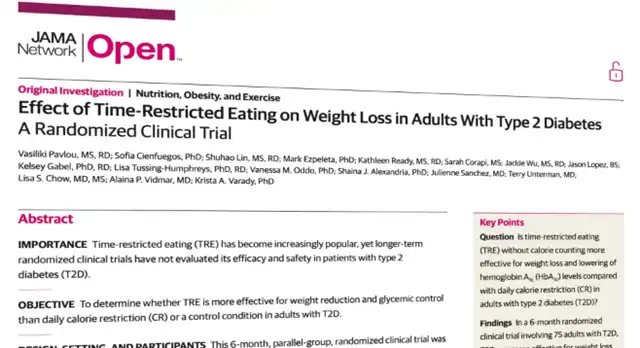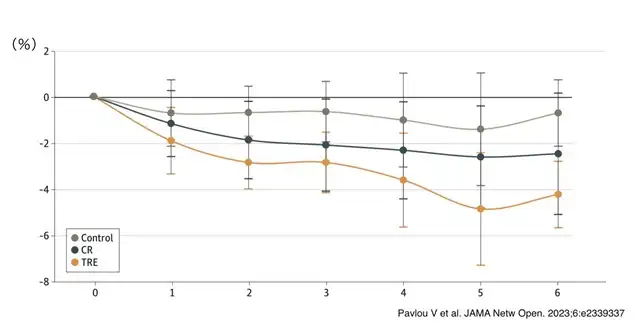Weight Loss: The Efficacy of 16-Hour Fasting Over Calorie Restriction
- Normal Liver Cells Found to Promote Cancer Metastasis to the Liver
- Nearly 80% Complete Remission: Breakthrough in ADC Anti-Tumor Treatment
- Vaccination Against Common Diseases May Prevent Dementia!
- New Alzheimer’s Disease (AD) Diagnosis and Staging Criteria
- Breakthrough in Alzheimer’s Disease: New Nasal Spray Halts Cognitive Decline by Targeting Toxic Protein
- Can the Tap Water at the Paris Olympics be Drunk Directly?
Scientifically Proven Weight Loss: The Efficacy of 16-Hour Fasting Over Calorie Restriction
- Should China be held legally responsible for the US’s $18 trillion COVID losses?
- CT Radiation Exposure Linked to Blood Cancer in Children and Adolescents
- FDA has mandated a top-level black box warning for all marketed CAR-T therapies
- Can people with high blood pressure eat peanuts?
- What is the difference between dopamine and dobutamine?
- How long can the patient live after heart stent surgery?
Scientifically Proven Weight Loss: The Efficacy of 16-Hour Fasting Over Calorie Restriction, According to Latest Medical Paper
More Effective Than Calorie Restriction: Scientific Validation of 16-Hour Fasting.
Many aspire not only to maintain their appearance but also to preserve their health.
In this article, we introduce the scientifically proven weight loss effect of “16-hour fasting,” as revealed in a paper published on October 27th in the academic journal “JAMA Network Open” by Vasiliki Pavlou and colleagues from the University of Chicago in the United States [Reference 1 at the end of the article].
JAMA Network Open, a clinical medical academic journal, is one of the four pillars in the clinical medical journal realm and is highly regarded for its reliable publications. The current JAMA Network Open is its sibling journal.

“Randomized Trial” for Scientific Verification Pavlou and team conducted a randomized trial to compare the weight loss effects of “16-hour fasting” and “calorie restriction.”
Randomized Trial: Participants are randomly assigned to each group for comparison, eliminating artificial biases to ensure high reliability.
The study involved 75 obese individuals with type 2 diabetes living in the United States. They were randomly assigned to three groups:
- Free eating from 12 PM to 8 PM, followed by a 16-hour fasting period from 8 PM to 12 PM the next day. Water and non-energy drinks were allowed during fasting (16-hour fasting).
- No time restrictions on meals, but energy intake cut by 25% (calorie restriction).
- No specific instructions (control group).
Including the “control” group allows observation of weight changes unrelated to “16-hour fasting” or “calorie restriction.” In other words, subtracting the weight change in the “control” group provides the true weight loss effects of “16-hour fasting” or “calorie restriction.”
Achieving Almost Rebound-Free Weight Loss with “16-Hour Fasting” and No Dietary Restrictions After six months…
In the “16-hour fasting” group, the weight decreased by 3.6% compared to the “control” group, equivalent to almost 4 kg.
The “calorie restriction” group showed no significant difference compared to the “control” group. While there was a decrease, it was statistically deemed not significant or “not by chance.”
Statistically non-random = significant. In medical research, if a difference is not “significant,” it is considered that there is “no difference.”
Adherence to the Berne Convention for Quotations What is noteworthy is that the weight in the “16-hour fasting” group continued to decrease over time, and there was no apparent “rebound.”

In contrast, weight loss due to “calorie restriction” plateaued after a certain period.
Breaking the Fast Once a Week is Permissible You can eat and drink as you like from 12 PM to 8 PM and continue to lose weight without rebounding. This is the effect of “16-hour fasting,” where you abstain from eating anything from 8 PM to 12 PM the next day.
Isn’t it appealing?
On the other hand, if you’re concerned about “not being able to have meals with friends when fasting every day after 8 PM,” worry not. Breaking the “16-hour fasting” once a week is permissible. The study revealed that, on average, participants did not follow the instructions once a week and still achieved weight loss.
In Conclusion How was it? This article introduced a paper stating, “You can eat and drink as you like from noon to 8 PM, but only consume water and non-energy drinks at other times,” which demonstrated weight loss through “16-hour fasting.”
Scientifically Proven Weight Loss: The Efficacy of 16-Hour Fasting Over Calorie Restriction
(source:internet, reference only)
Disclaimer of medicaltrend.org
Important Note: The information provided is for informational purposes only and should not be considered as medical advice.



